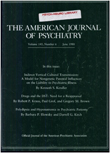DSM-III implications of the diagnoses of catatonia and bipolar disorder
Abstract
Although catatonia has traditionally been thought of as a type of schizophrenia, the author presents studies indicating that catatonia may be at least as common in bipolar disorder as it is in schizophrenia. He points out that changing definitions of schizophrenia and affective disorder require a reassessment of catatonia and its incorporation in modern diagnostic systems. The discussion represents material presented at the Affective Disorders Advisory Committee of the American Psychiatric Association Work Group to Revise DSM-III.
Access content
To read the fulltext, please use one of the options below to sign in or purchase access.- Personal login
- Institutional Login
- Sign in via OpenAthens
- Register for access
-
Please login/register if you wish to pair your device and check access availability.
Not a subscriber?
PsychiatryOnline subscription options offer access to the DSM-5 library, books, journals, CME, and patient resources. This all-in-one virtual library provides psychiatrists and mental health professionals with key resources for diagnosis, treatment, research, and professional development.
Need more help? PsychiatryOnline Customer Service may be reached by emailing [email protected] or by calling 800-368-5777 (in the U.S.) or 703-907-7322 (outside the U.S.).



